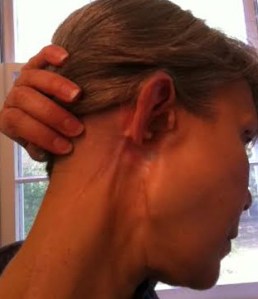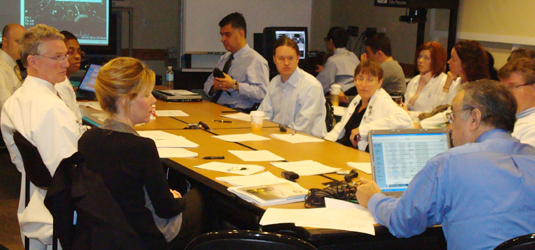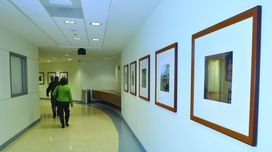The weapons we fight with are not the weapons of the world. On the contrary, they have divine power to demolish strongholds. (2 Corinthians 10:4)
For the first three nights after my discharge from UNC Memorial Hospital on Friday, December 9, I slept upright on the sectional sofa in our family room in an attempt to keep the swelling down on the right side of my face from where the tumor had been removed. I slept well, and even though I was still apart from Gil, who slept upstairs in our bedroom, it was comforting just to be back in my own home. Gil rented movies for me to watch and waited on me constantly over the weekend.
On Monday morning Caleb returned to school in order to finish taking his final exams and Gil, who works at the school Caleb attends, returned also. Gil had arranged to have friends stay with me during the work week, since I would be at home alone, but I was feeling so good that I emailed our friends and told them their service would not be needed. By God’s grace, my recovery was proceeding at a rapid pace.
One thing that bothered me, though, was the position of my right ear. In order to remove the tumor, long incisions were made both in front of my ear and behind it. My ear lobe was also removed because the tumor had compromised the skin just below it. Then, in order to close the wound, Dr. Weissler had to pull tight the surrounding skin and once the incisions were stapled together my ear ended up positioned at a slightly odd angle. It stuck out from the side of my head in a way that made it look more like an ear that belonged to a hobbit than to a human being.

A selfie.
I have to admit it took me a long time to make my peace with my “new” ear. My hearing was a bit compromised, too, and still is – I have to lean in when someone is speaking to me in a low voice. And on really humid days or after a shower it feels like the inside of my right ear is expanding like a dry sponge when water touches it. But thankfully, I no longer find that sensation distracting and I have since reached the conclusion that my “hobbit” ear gives me opportunities to talk to people about how the Lord intervened mightily in my life. There is now a story that goes with that ear – and in it God is glorified.
My first post-op appointment with Dr. Weissler was on Wednesday, December 14, eight days after my surgery. Gil and I were anxious about this visit because we would also be receiving the pathology report on the tumor which was removed. This report would guide the doctors in determining what kind of follow-up treatment, if any, would be required. I was hoping that I wouldn’t need to undergo radiation treatments, especially in light of the disastrous visit I had with the radiation oncologist the day before my surgery. Radiation treatment to the neck area comes with a number of risks and very unpleasant side-effects, which I wanted to avoid.
We didn’t have to wait long before we were ushered into Dr. Weissler’s examining room. After a thorough examination of the surgical area he sat down at his computer and read aloud to us the pathology report. According to the report, the cancerous tumor arose from a benign tumor in the salivary gland duct, although it could not be determined why or when the tumor became cancerous. (It is not unusual for a cancerous tumor of the salivary gland to begin as a benign tumor.) However, to Dr. Weissler’s surprise, the cell-type of the cancer turned out to be myoepithelial.
Although a cancer is named after the tissue or organ in which it originates – even if it metastasizes to another part of the body – there are many different kinds of cells within the tissues and organs of the body, so it is important to define the cancer’s cell type. Epithelial cells are found throughout the body, particularly in ducts and glands, like a salivary gland. The pathology report also noted that this cell type was not likely to metastasize (that is, not likely to spread to another site in my body). Furthermore, there was no sign of cancer in the lymph nodes which Dr. Weissler removed from my neck and this confirmed that the cancer had not spread beyond the parotid gland. However, the size of the tumor was large: 4.2 centimeters. Yet, because there was no lymph node involvement and the margins were clear, the tumor was designated as stage 3.
After reading the report to us, Dr. Weissler said that the report would be the topic of discussion on Friday morning at the “Tumor Board” – a team of E. N. T. oncology surgeons and medical oncologists who treat head and neck cancers. They would discuss my case and recommend a follow-up treatment. Dr. Weissler would have to miss that meeting because he was scheduled for surgery but he told us what his message to the board would be: “It’s a very aggressive cancer.” He was very concerned about a recurrence (a return of the cancer at the site from where the tumor was removed), which could happen if any microscopic cancer cells had been left behind. As his words echoed through my mind, I realized that this might mean I was in for an exceedingly aggressive treatment regimen.

A meeting of the UNC Head and Neck Oncology Tumor Board. Dr. Weissler is seated on the left.
We left the medical center thankful for the good news in the report. Although the cancer was very aggressive, it had not spread – by God’s grace. Furthermore, now that it was out, it was identified and a protocol could be developed to keep it from returning. Five days later I saw Dr. Weissler again – on the Monday following the meeting of the Tumor Board – and I also met that same day with Dr. Hayes, a medical oncologist, and Dr. Chera, both of whom would be overseeing whatever follow-up treatment would take place.
The recommendation of the Tumor Board was that I undergo radiation treatment and that it begin as soon as possible. However, there was disagreement among the oncologists and surgeons about whether chemotherapy, given in addition to radiation, would make any difference to my long-term prognosis. Dr. Hayes explained that there was no hard evidence that chemotherapy, administered once a week for seven weeks during the same period of time in which I was receiving daily radiation treatments, would lower my risk of recurrence.
However, he theorized that the chemotherapy treatments would destroy any lingering cancer cells weakened, but not destroyed, by the radiation. He urged me to do both treatments because recurrences were difficult to treat. If I underwent only radiation and the cancer returned, he thought I would regret not having done everything I could have done to prevent the recurrence. He assured me that I was not likely to experience any hair loss from the chemotherapy because it would be administered at a low dose. However, I was likely to experience some nausea, beginning two days after each treatment and subsiding two days after that, but he thought it would be mild.
Following the appointment with Dr. Hayes, we then took the elevator from the second floor down to the basement of the UNC Cancer Hospital to meet with Dr. Chera who would oversee my radiation treatments. He explained that due to the aggressive nature of the cancer, I would be receiving the maximum dose of radiation – thirty-three treatments (compared to the usual regimen of thirty for a salivary gland cancer), administered one per day, five days a week, for six and a half weeks.

The hallway outside the Radiation Oncology waiting room.
Because I would be receiving the maximum dose, and would likely experience more severe side effects from the radiation, Dr. Chera did not recommend that I also undergo the chemotherapy treatments. He thought the side effects from both would be too much to handle. Even without chemotherapy, many head and neck cancer patients undergoing radiation treatments reach a point where they are losing weight so rapidly because they are unable to swallow without intense pain that a feeding tube must be inserted.
Dr. Chera scheduled a follow-up appointment for two days after Christmas, which would give me eight days to make up my mind about the course of treatment. In the meantime I needed to schedule a visit with my dentist, to make sure my teeth and gums were healthy enough to withstand the likely side-effects of the radiation treatments. Once again, Gil and I were a bit stunned by the information we received from my doctors and the probability that the road ahead would be a challenging one for me.
I was now faced with a difficult decision to make: undergo chemotherapy and radiation simultaneously and risk becoming so ill from the side-effects of both that I might not be able to finish the treatments – or do only the radiation and wonder whether it was going to be effective enough in preventing a recurrence. Before we left Dr. Chera’s examination room, his intern returned with some paperwork for me to complete before my next visit. I asked him for advice about whether I should undergo the chemotherapy treatments. He replied, “If it were me, I’d just go ahead and do both.”
For the next several days Gil and I prayed about the decision. I began to question whether I was demonstrating a lack of faith in God’s ability to heal by undergoing further treatment. After all, the removal of the tumor without compromising my facial nerve was miraculous. Couldn’t the Lord just finish off, through prayer alone, any microscopic cancer cells that may have been left behind? Yet, at the same time, I didn’t doubt that God heals through medical intervention, in addition to prayer – and that surgery and medicine are among the weapons God puts at our disposal to heal the sick.
I thought some more about the theological conclusion I had reached about cancer after I was diagnosed with it in November – that it can only be viewed as something evil; there is no good to be found in it. And, since evil is not something that can be reformed, it must be defeated instead. As I prayerfully pondered these theological observations I became more and more convinced that I should not tread lightly in the face of cancer and instead use all the weapons God was placing at my disposal – medical as well as spiritual. Now, it was easy to make my decision: I would undergo both chemotherapy and radiation – and ask my friends and family to join with me in prayer asking the Lord to protect my body from the worst of the side-effects.

